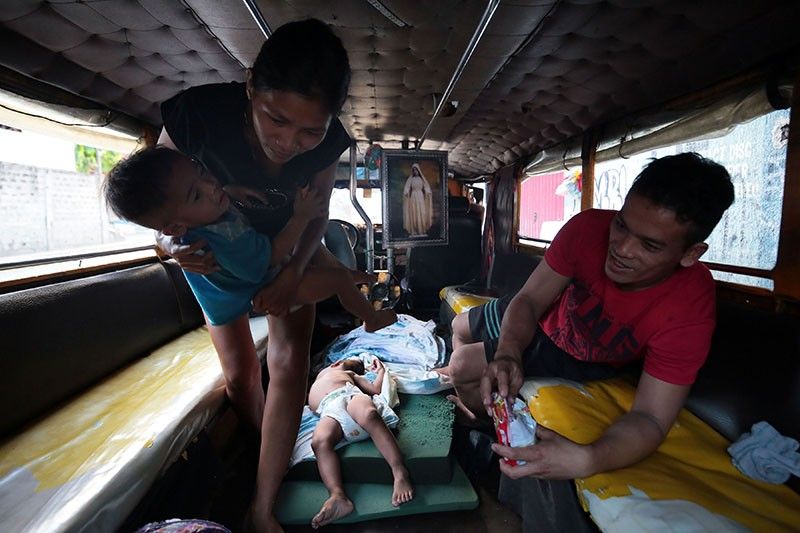Commentary: A ‘new normal’ even in governance

With about two weeks to go before the extended enhanced community quarantine (ECQ) expires on May 15, uncertainties still loom large for Filipinos. The government, the academe, and even social media have been liberally ballyhooing the term “new normal” to describe the setting of our post-pandemic life.
What exactly is the new normal? These are how we will do things in society differently. From the looks of it, an essential ingredient of this would be physical distancing—the term sociologists prefer to use over social distancing. But distancing in this highly-dense megapolis may be easier said than done.
Just look at the scenes from markets in the mornings and barangay halls during the distribution of relief goods and amelioration money. It is very evident, sad, and unfortunate how people are forced to put this rule in the backseat, even in the face of what could be life-and-death situations. Thus, it is not difficult to imagine the challenges we will have in keeping the rate of the virus spread low once the ECQ expires.
Of course, the sooner we jumpstart the economy, the sooner we can return to normalcy—whatever that may entail—though, at high public health risks. Or, we can choose to take our sweet time, cooped up indoors, waiting for the country to ride out the pandemic.
But the longer the economic torpor becomes, the more damaging it would be, to the point of a prolonged economic coma. As pundits would say, we are doomed one way or the other.
The recently organized public-private National Task Force T3 (Test, Trace and Treat) supported by the Asian Development Bank and initial members from private sector groups Ayala Healthcare Holdings Inc. (AC Health)/Qualimed, Metro Pacific Hospital Holdings Inc., Philippine National Red Cross, Philippine Disaster Resilience Foundation and Unilab, aims to expand testing capacity to at least 30,000 tests per day by end of May. The success of this project will finally provide the needed data that will be critical in guiding the IATF’s moves to lift the ECQ.
Inevitably, the lockdown will be lifted, and we will have to try picking up our lives where we left off. For a lot of Filipinos, however, the main issue is economic survival—not necessarily the country’s, but theirs. Of course, these two are inextricably intertwined, but this connection may be hazy at best for the individuals. This is where the government comes in.
The first order of business is to inspire confidence that the government knows what it is doing. Rather than unceasingly sounding off a martial law declaration, having late-night ramblings or making us listen—under the guise of a national address—to his panegyric on China and Xi Jinping, President Rodrigo Duterte can better serve the country by figuratively rolling up his sleeve and buckling down to work with a sense of urgency and purpose.
The president may create an advisory council on rebuilding the economy composed of people with sufficient know-how and credibility. This new body would signal a government turning over a new leaf. The administration can leave behind its trial-and-error approach to public health and move to a well-orchestrated economic recovery regime.
And one of the better ways to get the economy back on its feet is to keep the food supply moving. There is nothing that communicates stability more than having food on the table.
The logic is simple: if food supply is continuous, that means several other things continue going, such as production, distribution, consumption, employment, livelihood, etc. At the very basic level, a company producing food will need employees, suppliers and distributors. Imagine the multiplier effect of this. It is therefore imperative for the manufacturing sector to be allowed to continue.
In the early weeks of the lockdown, fearing threats of hoarding and overpricing that could lead to a civil disturbance caused by food shortage, the government was aggressive in announcing that there was nothing of that sort in the horizon and that food supply remained adequate.
However, in spite of repeated government assurance—or, perhaps, because of it—people went ahead with panic buying causing basic commodities to become scarce. Complicating the situation further was, according to government, the overzealous implementation of the ECQ that resulted to a misinterpretation of the policy.
Of course, this can be true. But it could also be another case of lack of foresight by clumsy policy-makers who were jolted into the reality of having a responsibility as gargantuan as keeping Metro Manila in a lockdown.
By the same reasoning, we should keep other essential goods and services moving freely to support basic human activities, such as healthcare, fuel and power, transportation, communication and other public utilities.
A “new normal” in governance is also needed. The government may look at its role and that of business as more complementary rather than antagonistic. The president can take his political capital out for a spin and rally support for programs and policies that will help keep businesses alive and the economy afloat. These can be in terms of bridge financing, temporary easing of taxes, or even logistical support. Extending shopping hours, for example, as simple as it may look, contributes to spurring movement of goods.
In turn, however, the business sector has to commit to take care of its employees—by keeping them employed, for starters. And, that is how we can hope to emerge from the pandemic ashes.
Edwin Santiago is a fellow and member of the editorial board of think tank Stratbase ADR Institute.
- Latest




























